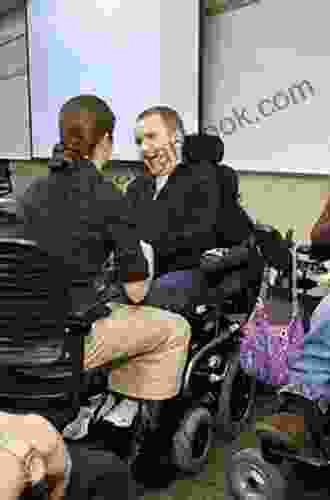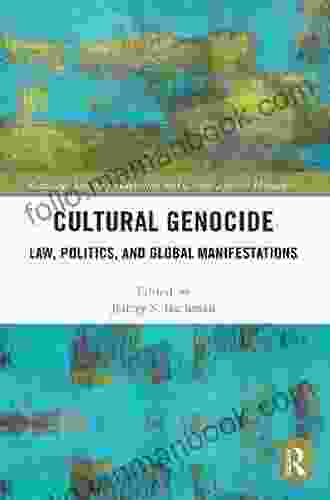Law, Politics, and Global Manifestations: Routledge Studies in Genocide and Crimes Against Humanity

1 of 2
5 out of 5
| Language | : | English |
| File size | : | 10098 KB |
| Screen Reader | : | Supported |
| Print length | : | 302 pages |
This book explores the complex relationship between law, politics, and global manifestations of genocide and crimes against humanity. It examines the ways in which law can be used to prevent and punish these crimes, as well as the ways in which politics can shape the development and implementation of law. The book also considers the role of global institutions in addressing genocide and crimes against humanity, and the ways in which these institutions can be strengthened to better prevent and respond to these crimes.
The Role of Law in Preventing and Punishing Genocide and Crimes Against Humanity
Law plays a vital role in preventing and punishing genocide and crimes against humanity. International law provides a framework for defining these crimes, and it establishes norms and standards that states are obligated to uphold. Domestic law can also play a role in preventing and punishing these crimes, by providing for the prosecution of individuals who commit them. However, the effectiveness of law in preventing and punishing genocide and crimes against humanity depends on a number of factors, including the political will of states to enforce the law, the capacity of states to investigate and prosecute these crimes, and the cooperation of states with international institutions.
The Role of Politics in Shaping the Development and Implementation of Law
Politics can play a significant role in shaping the development and implementation of law. Political ideologies can influence the way that law is interpreted and applied, and political interests can lead to the adoption of laws that are designed to protect certain groups or individuals at the expense of others. In the case of genocide and crimes against humanity, politics can play a role in determining whether these crimes are recognized and punished, and in shaping the way that they are prosecuted.
The Role of Global Institutions in Addressing Genocide and Crimes Against Humanity
Global institutions play an important role in addressing genocide and crimes against humanity. These institutions can provide a forum for states to cooperate on preventing and punishing these crimes, and they can provide resources and expertise to states that are struggling to address these crimes. Global institutions can also play a role in raising awareness of genocide and crimes against humanity, and in advocating for the rights of victims.
Strengthening Global Institutions to Better Prevent and Respond to Genocide and Crimes Against Humanity
There are a number of ways to strengthen global institutions to better prevent and respond to genocide and crimes against humanity. One important step is to increase funding for these institutions, so that they have the resources they need to carry out their work. Another important step is to increase the political will of states to cooperate with these institutions, and to implement the recommendations that they make. Finally, it is important to raise awareness of genocide and crimes against humanity, so that the public can demand that their governments take action to prevent and punish these crimes.
Genocide and crimes against humanity are serious crimes that have a devastating impact on individuals, communities, and societies. Law, politics, and global institutions all have a role to play in preventing and punishing these crimes. By working together, we can strengthen the global response to genocide and crimes against humanity, and we can help to create a world where these crimes are no longer tolerated.
5 out of 5
| Language | : | English |
| File size | : | 10098 KB |
| Screen Reader | : | Supported |
| Print length | : | 302 pages |
Do you want to contribute by writing guest posts on this blog?
Please contact us and send us a resume of previous articles that you have written.
 Top Book
Top Book Novel
Novel Fiction
Fiction Nonfiction
Nonfiction Literature
Literature Paperback
Paperback Hardcover
Hardcover E-book
E-book Audiobook
Audiobook Bestseller
Bestseller Classic
Classic Mystery
Mystery Thriller
Thriller Romance
Romance Fantasy
Fantasy Science Fiction
Science Fiction Biography
Biography Memoir
Memoir Autobiography
Autobiography Poetry
Poetry Drama
Drama Historical Fiction
Historical Fiction Self-help
Self-help Young Adult
Young Adult Childrens Books
Childrens Books Graphic Novel
Graphic Novel Anthology
Anthology Series
Series Encyclopedia
Encyclopedia Reference
Reference Guidebook
Guidebook Textbook
Textbook Workbook
Workbook Journal
Journal Diary
Diary Manuscript
Manuscript Folio
Folio Pulp Fiction
Pulp Fiction Short Stories
Short Stories Fairy Tales
Fairy Tales Fables
Fables Mythology
Mythology Philosophy
Philosophy Religion
Religion Spirituality
Spirituality Essays
Essays Critique
Critique Commentary
Commentary Glossary
Glossary Bibliography
Bibliography Index
Index Table of Contents
Table of Contents Preface
Preface Introduction
Introduction Foreword
Foreword Afterword
Afterword Appendices
Appendices Annotations
Annotations Footnotes
Footnotes Epilogue
Epilogue Prologue
Prologue Reyna Biddy
Reyna Biddy Lynsay Sands
Lynsay Sands Lb Sedlacek
Lb Sedlacek Aleister Crowley
Aleister Crowley V Balderston
V Balderston Cathy Cash Spellman
Cathy Cash Spellman Christopher Willard
Christopher Willard Allan Odden
Allan Odden Tracey West
Tracey West Samuel Beckett
Samuel Beckett Miranda Cowley Heller
Miranda Cowley Heller Jan Sheinker
Jan Sheinker Yaswanth Nukasani
Yaswanth Nukasani Alastair Reynolds
Alastair Reynolds Steven Towns
Steven Towns Thomas Greanias
Thomas Greanias Rosalind Rousseau
Rosalind Rousseau Paul Barry
Paul Barry Donna Leon
Donna Leon Kia Moore
Kia Moore
Light bulbAdvertise smarter! Our strategic ad space ensures maximum exposure. Reserve your spot today!

 Michael ChabonThe Early Start Denver Model: A Comprehensive Guide for Supporting Young...
Michael ChabonThe Early Start Denver Model: A Comprehensive Guide for Supporting Young...
 Brady MitchellJohn Maynard Keynes: A Revolutionary Economic Thinker and His Lasting Legacy
Brady MitchellJohn Maynard Keynes: A Revolutionary Economic Thinker and His Lasting Legacy Dean CoxFollow ·16.6k
Dean CoxFollow ·16.6k Ray BlairFollow ·3.8k
Ray BlairFollow ·3.8k Edison MitchellFollow ·9.1k
Edison MitchellFollow ·9.1k Edmund HayesFollow ·3.2k
Edmund HayesFollow ·3.2k John GrishamFollow ·16.3k
John GrishamFollow ·16.3k Ernest ClineFollow ·11.3k
Ernest ClineFollow ·11.3k Aron CoxFollow ·2.9k
Aron CoxFollow ·2.9k Beau CarterFollow ·19.5k
Beau CarterFollow ·19.5k

 Dean Cox
Dean CoxHow to Make Decisions Easily & Effortlessly: The...
The Different Types of Decisions There...

 Gustavo Cox
Gustavo CoxThe End of World War II and the Birth of Baseball's...
The end of...

 Patrick Rothfuss
Patrick RothfussThe Dantes: An 11-Family Saga of Billionaires, Soulmates,...
The Dantes is an epic family saga that follows...

 Dylan Mitchell
Dylan MitchellSuper Friends: The Animated Adventures That Defined a...
In the vibrant landscape of American...

 Jamal Blair
Jamal BlairCollege For Students With Disabilities: We Do Belong
College can be a...
5 out of 5
| Language | : | English |
| File size | : | 10098 KB |
| Screen Reader | : | Supported |
| Print length | : | 302 pages |










